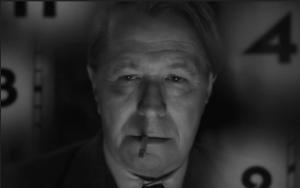MANK: 4 STARS. “brings a lesser known historical figure to bawdy life.”
 William Randolph Hearst and Orson Welles will forever be connected in our imagination courtesy of “Citizen Kane.” In the film, often regarded as one of the best ever made, Welles plays a thinly veiled version of newspaper magnate Hearst as self-absorbed, power-mad and wounded. “Mank,” a new film directed by David Fincher and streaming on Netflix on December 4, isn’t a making-of story about the film, but more the unmaking of its screenwriter Herman J. Mankiewicz (Gary Oldman).
William Randolph Hearst and Orson Welles will forever be connected in our imagination courtesy of “Citizen Kane.” In the film, often regarded as one of the best ever made, Welles plays a thinly veiled version of newspaper magnate Hearst as self-absorbed, power-mad and wounded. “Mank,” a new film directed by David Fincher and streaming on Netflix on December 4, isn’t a making-of story about the film, but more the unmaking of its screenwriter Herman J. Mankiewicz (Gary Oldman).
Former drama critic, playwright, columnist and Algonquin Round Table wit. Mankiewicz moved to Hollywood with the promise of a contract and a career. Heading west from New York, he quickly found himself working steadily ghost-writing films. As his reputation grew, so did his bank account. “Millions are to be grabbed out here and your only competition is idiots,” he telegraphed to writer Ben Hecht. Known as a hard drinker and inveterate gambler, when we first meet him in “Mank,” he’s bandaged up from a recent, drunken car accident. Welles (Tom Burke) and John Houseman (Sam Troughton) have sent the writer to a ranch in the sunbaked Mojave Desert to dry out with the help of a German nurse (Monika Grossman) and a secretary (Lily Collins), and work on the script for what will become “Citizen Kane.”
At one point in the film Mankiewicz says, “You cannot capture a man’s entire life in two hours. All you can hope is to leave the impression of one.” Fincher, working from a script penned by his late father, columnist Jack, supplies a vivid snapshot of a man from a particular point of view.
Shot in luscious black and white, the story is told on a broken time line, à la “Citizen Kane,” as the action springs back and forth between the past and the present. Oldman, as Mankiewicz, staggers through the movie causing a scene at a costume dinner party at Hearst’s San Simeon estate and platonically courting his friend, movie star Marion Davies (Amanda Seyfried), who also happens to be Hearst’s mistress. He’s poured into bed by his long-suffering wife (Tuppence Middleton) and goes to war with Louis B. Mayer (Arliss Howard), professionally and politically– “If I ever go to the electric chair,” he says of Mayer, “I’d like him to be sitting in my lap.”—while ignoring potentially career saving advice from his brother (Tom Pelphrey). Each vignette adds DNA to the portrait, as his disillusionment with Hollywood, politics and power grows by the moment. “Every moment of my life is treacherous,” Mank says.
Oldman plays Mankiewicz as a sharp wit who has grown tired of the world he inhabits. Drink, as his brother Joe says, has made him the “court jester” of Hollywood, a man whose genius is squandered in pursuit of booze and a sure bet at the racetrack. There’s a mischievousness to the performance that is tempered by the profound sadness of someone who sees their genius reduced to doing creative work for hire. His script for “Citizen Kane,” which was supposed to be credited solely to Welles, earned him an Oscar and may have been his last chance to speak his truth to power. “Write hard,” he says. “Aim low.”
Oldman is suitably ragged and ribald, bringing a lesser known historical figure to bawdy life but it is Seyfried who almost steals the show. As Marion Davies he is the epitome of old Hollywood glamour but behind the sequins and wide eyes is a deep well of intelligence that Seyfried slyly imbues into her character. When she and Oldman are side-by-side, the movie sings.
In many ways “Mank” echoes “Citizen Kane.” In structure, in its fragmented storytelling approach and its luscious recreation of the period but as a portrait of a man it feels lesser than. Mank is an engaging character but the depth that Kane plumbed to portray the character is missing. It succeeds as a look at power and its corrosive effects but as a character study its colorful but feels slightly under inflated.
